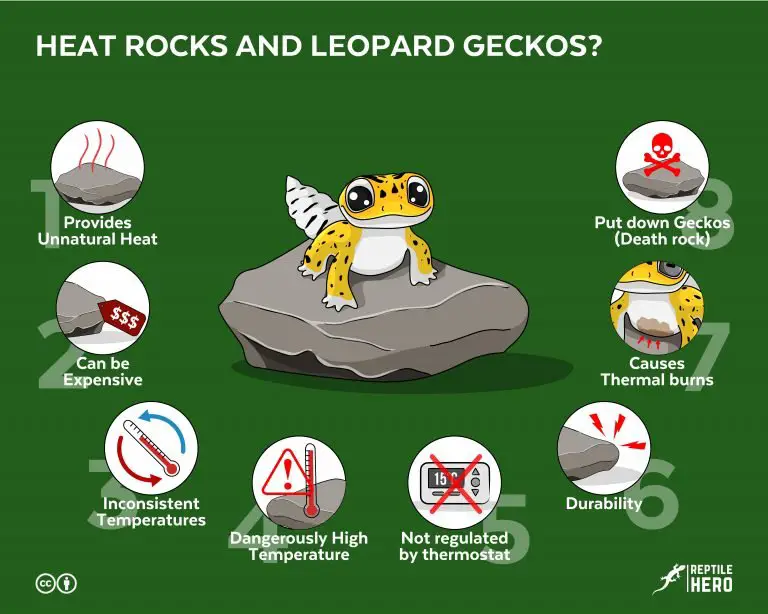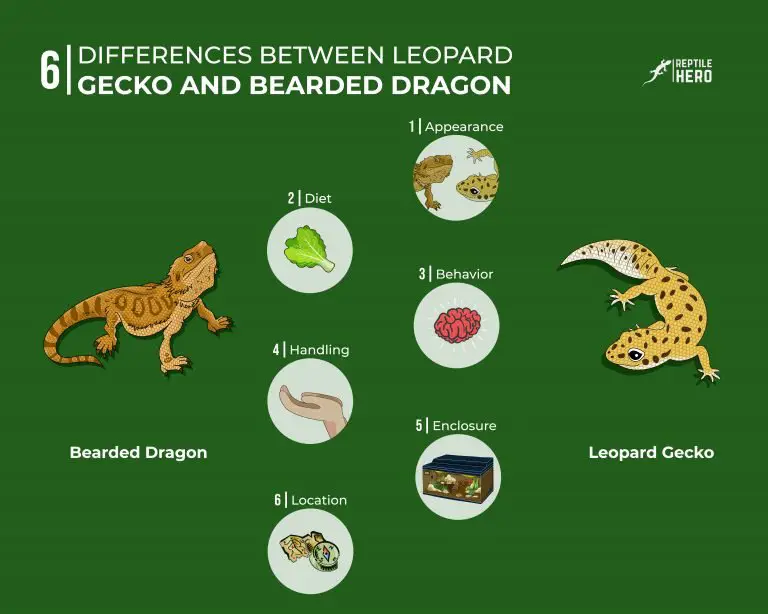Do Leopard Geckos Eat Cork Bark? (Should You Be Worried?)
Cork bark is a common material used to make various tank decors and provisions, so what would happen if your leopard gecko eat it? Has any owner ever witnessed their leo doing it? There are indeed many concerns that come with this possibility, so let’s explore them!
In general, healthy leopard geckos will not ingest whole cork bark if not accidentally, while eating or licking their lips. Aside from gut blockage, the consequences of eating cork bark are poorly understood. Nevertheless, owners are strongly advised to seek help from exotic veterinarians if their gecko ingests cork.
Geckos eating cork bark, be it deliberately or not, is uncommon but not unheard of. So how do you make sure your gecko doesn’t attempt it? Worse yet, what should you do if your gecko does get a good bite of cork bark? Continue reading to find out!
Is It Normal for Leopard Geckos to Bite or Eat Cork Bark?
Leopard geckos would not normally try to eat or take a bite of cork bark. More often than not, gecko owners have only mistaken licking or tongue-flicking for attempts of deliberately ingesting such material. However, geckos may inadvertently consume small pieces of cork while hunting for live feeder insects.
They don’t even usually eat plant materials in the wild. Leopard geckos mostly just whatever insects they find and other smaller prey—all of which attract the attention of hungry reptiles due to their movement.
Compared to live prey, cork bark will not move an inch unless you change the way it’s laid or positioned in your gecko’s tank. So I can’t really see why cork would ever look appetizing for our cute little geckos.
In fact, one friend of mine who has a leo that’s very particular about his insects (dare I say, picky) would immediately spit out parts of its live feeders when there’s some soil and bits of cork on it.
Geckos and Cork Bark: Eating VS Licking
From the handful of stories I do come across about geckos “eating” bark, the owners typically admit that they aren’t sure if that is indeed what their scaly babies are trying to do.
Others would even clarify that rather than biting, it looks more like their geckos are trying to get a good taste of cork bark by licking it. This is a common misconception that is held by newbie gecko pet parents.
When a gecko licks or flicks its tongue near cork bark it usually isn’t trying to consume the material. In reality, leopard geckos do this quite often to investigate their surroundings, among other things.
Discover more reasons behind such a behavior in our article on why geckos lick objects.
5 Possible Reasons Why Geckos Eat Cork Bark (Rare Cases)
A leopard gecko—or any other reptile—may possibly be observed intentionally biting or eating cork bark flats, rounds, tubes, branches, and chucks due to: feeder scent, stress, boredom, nutrient deficiency, and digestion issues.
Honestly, these are just theories proposed by both experienced keepers and experts so we can’t say for certain [1].
1. Feeder Scent
If an insect’s smell rubs off on cork bark, geckos may have the impression that it is hiding behind or inside it and try to get a hold of the non-existent prey.
2. Stress
Geckos that are feeling very distressed are more likely to engage in unusual and possibly dangerous behavior such as eating inedible materials like cork bark. This is similar to what humans call pica.
3. Boredom
When a gecko is kept in a small and bare tank, it will inevitably experience under-stimulation, otherwise known as boredom. As result, it may try to entertain itself by doing uncharacteristic things, like biting or excessively licking cork bark.
Keep your geckos occupied and stimulate with our article on enrichment ideas and toys.
4. Nutrient Deficiency
Some have also pointed out the possibility that geckos and other reptiles may be ingesting cork bark to make up for nutrients that are currently lacking in their diets.
Quite honestly, though, I am inclined to disagree with this theory. Why? Because other than fiber, which they can get from various insects, I don’t think cork will provide any other nutrient for geckos.
Moreover, this behavior has only been linked with calcium and vitamin sands.
5. Digestion Issues
Typically, geophagy, or the act of eating soil-based substrates and materials like twigs and stones, is believed to be done to help with digestion in certain animals. Since geckos cannot thoroughly chew on insects, they ingest inedible materials to help break done their food.
Some have argued that this may also explain why leopard geckos would ever eat chunks of cork bark. But I have yet to find a study that can definitively prove this to be true.
How can gecko owners prevent geckos from eating cork bark?
Owners can easily prevent their geckos from eating cork bark by providing them with a balanced diet and enrichment opportunities. Besides that, practicing up-to-date, science-backed husbandry practices will improve the overall well-being of geckos and effectively prevent the consumption of non-food items in their tank.
Learn more about this in our article on the benefits and risks of enrichment.
Just to reiterate, it’s not normal for leopard geckos—or any other reptile, for that matter—to eat cork bark. Also, it is very rarely observed. But it can still happen.
So it is essential to understand why a gecko may behave in such a way and learn how you, as its caretaker, can prevent it from happening.
What Happens If a Leopard Gecko Eats Cork Bark? (What to Do)
A leopard gecko that eats a sizable piece of cork bark larger than ½ cm—accidentally or intentionally—is likely to suffer from gut blockage. But if a gecko only consumes a few small pieces of cork bark, it is expected to easily expel the material without much issue. Either way, it is best to contact a veterinarian for examination and consultation.
Unfortunately, the full effects of eating cork bark on geckos are not well understood as it is quite rare and thus not widely observed. Plus, it’s not really a popular topic in research.
There are also ethical concerns that come with trying to replicate this in the lab. It wouldn’t be right to force geckos to eat cork just to see how that would affect them, right?
As such, I think that it would be best to stay on the side of caution when you suspect or have witnessed your gecko eat cork bark.
Look out for the following signs of illness if your gecko ingests cork bark:
- Lethargy/inactivity
- Sunken eyes
- Loss of appetite
- Abdominal swelling
- Vent prolapse
- Lack of defecation
- Regurgitation
If you see your gecko display any of these, immediately contact your local veterinarian—ideally one that’s experienced with handling reptiles.
What is a Cork-Bark Leaf-Tailed Gecko?
The cork-bark leaf-tailed gecko (Uroplatus pietschmanni) is an endangered species that is endemic to Madagascar. Its most popular common name is derived from its physical appearance which highly resembles cork bark.
Now that we’re on the topic of geckos and cork bark, I thought it would be great to end this article by introducing you to a cool species that combines both!
Like many other closely-related gecko species in the region, the cork-bark leaf-tailed gecko is a nocturnal gecko that mostly lives among the canopies of tropical and subtropical forests in Madagascar [2]. Its coloration and physical appearance allow it to camouflage among trees.
Similar to most other geckos, the cork-bark leaf-tailed gecko lays two eggs per clutch as well. However, due to mining, logging, and other destructive activities in its home, they are considered to be highly endangered.
This beautiful gecko is rarely seen both in its native habitat and in the reptile-keeping community.
Only a few sightings have been reported in Fierenana, Ambatovy, and Analamay. Despite having past export records of 500 per year, it is now known to be greatly reduced if not totally eliminated already.
More familiar relatives of the cork-bark leaf-tailed gecko include:
- Satanic leaf-tailed gecko (Uroplatus phantasticus)
- Gunther’s leaf-tailed gecko (Uroplatus guentheri)
- Henkel’s leaf-tailed gecko (Uroplatus henkeli)
- Mossy leaf-tailed gecko (Uroplatus sikorae)
Further Questions
Do cork bark decors for gecko tanks grow mold?
Flats, rounds, tubes, branches, and chunks of pure cork bark are generally considered mold-resistant. This is primarily because they are highly impermeable to water and moisture. However, if kept in gecko tanks that are very dirty and constantly humid, cork bark may develop mold and mildew on the surface.
Should you sterilize cork bark before adding it to a gecko tank?
Most experienced keepers recommend sterilizing cork bark decors before adding them to gecko tanks. This is to ensure that no harmful or unwanted insects and microorganisms were inadvertently packed together with the cork bark. Some sterilize it by baking, washing, or simply brushing off excess dust from it.
Will my gecko tank’s cork bark burn in the oven?
Cork bark is fire-resistant as pure cork is highly resistant to combustion so it shouldn’t burn when baked in the oven. It will only ignite if exposed to extreme heat (way above 300°F) or direct open flame. Furthermore, broken down pieces of cork and dust can burn as it no longer has the same integrity as whole cork bark.
Summary of Do Leopard Geckos Eat Cork Bark?
Both wild and captive leopard geckos are not known to deliberately try to eat tank decors and furnishings made from whole cork bark. Generally, pet owners simply misinterpret normal licking and tongue-flicking behavior with attempts of eating or biting the cork.
In the rare cases that a leopard gecko does ingest small pieces of cork bark, it is often accidental. Otherwise, a gecko that is sick or kept in bad tank conditions may intentionally consume cork bark but this is very unusual.
Geckos may easily pass or have trouble safely eliminating cork bark from their system, depending on the size and amount they have ingested. Nonetheless, setting up an emergency appointment with an experienced reptile veterinary doctor is recommended if a gecko has eaten cork bark.
Sources
[1] https://www.sciencedirect.com/science/article/abs/pii/S1094919405000095?via%3Dihub


![What Do Gecko Eggs Look Like? [Size, Color, and More]](https://www.reptilehero.com/wp-content/uploads/2021/03/word-image-25-768x576.png)

![Can You Train Your Gecko? [5 Tricks It Can Learn Now]](https://www.reptilehero.com/wp-content/uploads/2021/02/Gecko-Training-Infographic-768x614.jpg)
![Is Your Leopard Gecko Fat? 10 Signs [Infographic and Tables]](https://www.reptilehero.com/wp-content/uploads/2021/02/word-image-30-768x576.png)
![10 Reasons Why Your Gecko Is Sneezing [With Solutions]](https://www.reptilehero.com/wp-content/uploads/2021/03/Why-gecko-sneeze-cc-768x614.jpg)